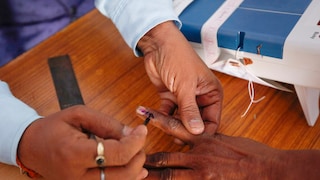Written By: Salvatore Babones
News18.com
Last Updated: March 19, 2024, 23:06 IST
New Delhi, India
For states and Union Territories that are large enough to have five or more representatives, equality of representation should be the rule. (Representational image/PTI)
“One person, one vote” is the fundamental principle on which all democracies are based. That fundamental principle was enshrined in the Indian Constitution adopted on January 26, 1950. But in a clear contradiction of the wisdom of India’s founding fathers, it no longer applies today.
Indira Gandhi ended the equal representation of the people of India in 1977, India’s politicians endorsed unequal representation in 2002, and the Supreme Court of India seems to believe that unequal representation is consistent with the basic structure of the Constitution.
As a result, every Keralan is now worth approximately 1.8 Rajasthanis, and everyone in Tamil Nadu has the vote of 1.6 Biharis. Andhra Pradesh, Odisha, and Telangana similarly get extra votes, while Delhi, Haryana, Madhya Pradesh, and Uttar Pradesh come up short.
Proponents of unequal representation in India claim that states should be rewarded for limiting population growth. By that reasoning, they must also be penalised for having dynamic economies that attract internal migrants. That’s the story in Delhi, Haryana, and Maharashtra.
The entire fertility argument is as specious as it is anti-democratic. After 1977, fertility fell no faster in the south than in the north. It started out lower and it ended up lower. In fact, the decline in fertility rates—the policy outcome that was used to justify unequal representation—has actually been more rapid in the north than in the south.
In reality, everyone knows why India’s political class has agreed to freeze representation at 1977 levels. It’s to ensure that no politician’s seat will be pulled out from under his or her you-know-what. And it keeps the peace by buying off petulant southerners who would otherwise raise a fuss over tax transfers.
There is, after all, a strong correlation between per capita income and Lok Sabha overrepresentation. Richer people pay more taxes and it’s easy for them to believe that that entitles them to more representation. In a plutocracy, it would. In a democracy, it doesn’t.
India is the world’s only democracy that violates the principle of one person, one vote. Strangely, the international democracy rankings don’t seem to mind. Like India’s own intellectuals, they seem happy with the idea of unequal representation, as long as the people getting the extra representatives are relatively rich, relatively well-educated and relatively on their side of politics.
Unequal representation is nothing new. The English parliament used to be famous for its “rotten boroughs”—electorates that still returned representatives based on Medieval populations who no longer lived there. They were eliminated by the Great Reform Act of 1832. The redrawing of constituencies is always controversial in the UK, but it is always done as the population changes, as it is in every other democracy.
Except India. Nearly two centuries after England’s Great Reform, India still has not returned to the principle of one person, one vote. India’s founding fathers understood this principle and embraced it. It is the one major blot on the record of Indian democracy that the current crop of Indian politicians cannot see their way to embracing the wisdom of their predecessors.
Some overrepresentation in very small states and Union Territories is inevitable. That’s part and parcel of the workings of a federal system. But for states and Union Territories that are large enough to have five or more representatives, equality of representation should be the rule. India needs a census and it needs a properly democratic delimitation exercise.
The author is an associate professor at the University of Sydney. He was a featured speaker at the News18 Rising Bharat Summit 2024. Views expressed in the above piece are personal and solely those of the author. They do not necessarily reflect News18’s views.
